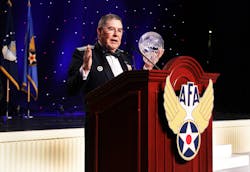AFA honors CAP with Lifetime Achievement Award for 70-plus years of contributing to national defense
MAXWELL AIR FORCE BASE, Ala. – The Air Force Association has honored Civil Air Patrol with its 2014 Lifetime Achievement Award in recognition of its more than 70 years of helping secure the American homeland, especially its service during World War II.
Brig. Gen. Larry Myrick, CAP national vice commander, accepted the award during the association’s Air & Space Conference in National Harbor, Md.
- During the presentation ceremony CAP was recognized:
“For selflessly protecting our shorelines and borders with personal aircraft … - “For encouraging women and more than 80,000 young Americans with an opportunity to serve during World War II …
- “And flying more than 750,000 mission hours by the war’s end.”
That legacy of heroism and sacrifice has also been recognized by Congress, which is awarding CAP the Congressional Gold Medal honoring the organization for its wartime service. President Barack Obama signed the medal into law May 30, and it will soon be presented in Washington, D.C., with a possible date of Dec. 10 for the ceremony. Additional information on the Congressional Gold Medal and CAP’s World War II service can be found at http://www.capgoldmedal.com/.
CAP’s beginnings date back to the week before Pearl Harbor; the organization was founded Dec. 1, 1941. Within a few weeks, its pioneering members were helping support the war effort by patrolling U.S. coastlines for German U-boats intent on sinking American oil tankers and cargo ships bound for Europe
After the enemy submarines began targeting vital merchant shipping within a few weeks of America’s entry into the war, mounting losses prompted leaders of the oil industry to call for protection. Lacking the patrol aircraft and vessels needed to meet those demands, military leaders agreed to allow CAP to conduct coastal patrol flights for a 90-day trial period. The mission was so successful that it was extended to last 18 months, from March 1942-August 1943.
During that period CAP members, too young or too old for military service or prevented from enlisting for health-related or other reasons, flew a total of 24 million miles over the waters of the Atlantic and Gulf of Mexico. Many flew their own light aircraft, typically patrolling as far as 100 miles offshore, often with only a compass for navigation and a single radio for communication.
In all, they reported 173 suspected submarines, spotted 363 survivors and performed 5,684 special convoy missions at the behest of the Navy. They also reported 17 floating mines, 36 bodies, 91 ships in distress and 363 survivors in the water.
During the war years other CAP members, young and old, male and female, also patrolled the U.S. borders by air, towed targets for military trainees, spotted forest fires, conducted search and rescue missions, provided disaster relief and emergency transport of people and cargo, conducted orientation flights and flight training for future pilots and provided leadership and character training for teenage members.
As the auxiliary force of the Army Air Forces, by war’s end CAP had flown more than 750,000 hours on all missions, with a total loss of 65 members and 150 aircraft.
More than 200,000 Americans served in CAP during the war years. Most were ordinary citizens, but some had much higher profiles – such as a Hollywood director and prominent actors, a Wall Street financier, a popular comic strip creator, pioneering female aviators, future Tuskegee Airmen, a world-famous concert pianist, the co-president of a major brewery and the founder of a famed doughnut chain.
Civil Air Patrol, the official auxiliary of the U.S. Air Force, is a nonprofit organization with 60,000 members nationwide, operating a fleet of 550 aircraft. CAP, in its Air Force auxiliary role, performs about 85 percent of continental U.S. inland search and rescue missions as tasked by the Air Force Rescue Coordination Center and is credited by the AFRCC with saving an average of 70 lives annually. Its unpaid professionals also perform homeland security, disaster relief and drug interdiction missions at the request of federal, state and local agencies. The members play a leading role in aerospace education and serve as mentors to more than 24,000 young people currently participating in the CAP cadet programs. Performing missions for America for over 70 years, CAP will soon receive the Congressional Gold Medal in honor of the heroic efforts of its World War II veterans. CAP also participates in Wreaths Across America, an initiative to remember, honor and teach about the sacrifices of U.S. military veterans.
Visit www.gocivilairpatrol.com, www.capvolunteernow.com and www.capgoldmedal.com for more information.
